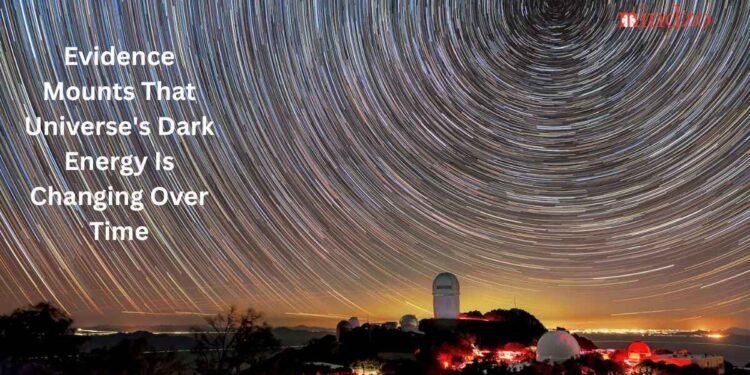What Is Dark Energy?
Evidence mounts that the universe’s dark energy is changing over time. Dark energy is an unseen force believed to be driving the expansion of the universe at an accelerating rate. Unlike dark matter, which interacts with gravity, dark energy is thought to be an inherent property of space itself.
The Discovery of Dark Energy
In 1998, astronomers studying distant supernovae found that the universe’s expansion wasn’t slowing down as expected—it was speeding up! This led to the realization that an unknown force, later named dark energy, was at play.
Why Scientists Thought Dark Energy Was Constant
For decades, scientists assumed dark energy was the same everywhere, governed by Einstein’s cosmological constant. This concept suggested that dark energy was a fixed, unchanging force embedded in space-time.
New Clues Suggesting Dark Energy Is Changing
Recent astronomical observations hint that dark energy might not be static. Instead, it could be evolving, either strengthening or weakening over cosmic time. This has sparked intense debate among physicists.
Observing the Universe: The Role of Supernovae
Supernovae serve as cosmic mile markers. By studying their brightness and distances, scientists can infer the rate of the universe’s expansion. Unexpected variations in these measurements suggest that dark energy’s influence might be shifting.
Cosmic Microwave Background (CMB) and Dark Energy
The CMB, a remnant of the Big Bang, provides a snapshot of the universe’s early days. Recent analyses indicate inconsistencies that could point to a changing dark energy component.
The Role of Quantum Physics in Dark Energy Evolution
Quantum mechanics suggests that vacuum energy—often associated with dark energy—might fluctuate over time due to interactions at the smallest scales of the universe.
How Changing Dark Energy Affects the Fate of the Universe
If dark energy is increasing, the universe might tear apart in a “Big Rip.” If it is decreasing, cosmic expansion could slow, potentially leading to a “Big Crunch.”
Alternative Theories: Is Einstein’s Cosmological Constant Wrong?
Some physicists propose that Einstein’s idea of a fixed cosmological constant needs revision. Alternative models like quintessence suggest a dynamic form of dark energy.
Implications for Space Exploration and Technology
Understanding dark energy’s behavior is crucial for interstellar travel. If space itself is changing, future space missions might need to account for unexpected shifts in cosmic conditions.
Future Experiments and Observations
Upcoming telescopes like the Vera C. Rubin Observatory and Euclid Space Telescope aim to gather more data on dark energy, potentially confirming or refuting its variability.
Challenges in Proving Dark Energy’s Variability
Studying dark energy is incredibly difficult due to its invisible nature. Scientists rely on indirect evidence, which makes definitive conclusions challenging.
What This Means for the Big Bang Theory
A dynamic dark energy model might require adjustments to our understanding of the universe’s origins and early expansion.
Public Interest: Why Should We Care?
The universe’s fate is directly tied to dark energy’s behavior. A changing dark energy could alter our understanding of existence itself, making this a subject of profound importance.
Conclusion: A Universe in Flux
Evidence mounts that the universe’s dark energy is changing over time The idea that dark energy might be changing over time is both thrilling and unsettling. If proven true, it could revolutionize physics and redefine our place in the cosmos. While more evidence is needed, one thing is certain: the universe is far more dynamic than we ever imagined.
FAQs
1. What is dark energy, and why is it important?
Dark energy is a mysterious force causing the universe to expand at an accelerating rate. Understanding it is crucial for deciphering the fate of the cosmos.
2. How do scientists measure dark energy?
Scientists study distant supernovae, cosmic microwave background radiation, and galaxy distributions to infer dark energy’s properties.
3. What would happen if dark energy disappeared?
If dark energy weakens, the universe’s expansion could slow down or even reverse, leading to a possible “Big Crunch.”
4. Are there alternative explanations for dark energy?
Some theories suggest modifications to gravity or exotic particles could explain the observed cosmic acceleration without needing dark energy.
5. Can we harness dark energy for technology?
Currently, dark energy is not something we can control or use, but future discoveries could open new possibilities for energy generation and space travel.




















